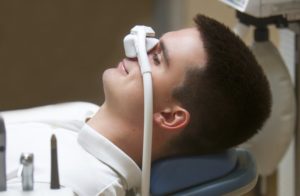This Is How Nitrous Oxide Sedation Affects Your Brain
November 7, 2019

In movies and on TV, whenever a patient gets a dose of laughing gas, they immediately break out in a fit of giggles. They appear to be having the time of their lives, even as they’re getting extensive dental work done. Is this how laughing gas actually works? A sedation dentist in Lewisville is here to talk more about laughing gas, or its more official name, nitrous oxide.
What Is Nitrous Oxide?
Nitrous oxide is a sedative, made of a mixture of nitrogen and oxygen, that is inhaled through a mask worn over your nose during a dental procedure. It helps you relax, easing your dental anxieties enough to get the care you need. You won’t fall asleep; you’ll be awake enough to respond to your dentist’s requests throughout the procedure. If you need dental work done but the thought of the dentist poking around in your mouth makes you freeze up in fear, then nitrous oxide might be just the thing you need.
Laughing gas affects you in three major ways:
- Reducing anxiety so your fear is gone
- Numbing you up so you don’t feel pain or the need to gag
- Creating euphoria so you feel good
When you first start breathing in the gas, you should start feeling light-headed almost immediately. You might experience a tingling sensation in your arms and legs. Some patients feel the opposite; their arms and legs start feeling heavy.
How Does It Affect Your Brain?
When you inhale nitrous oxide, it displaces the air in your lungs and prevents oxygen from reaching your brain and your blood. As a result of this oxygen deprivation, you might get the giggles. Some people might even experience mild hallucinations. Once you stop breathing in the gas, the effects wear off quickly. After your procedure, you should be able to drive yourself back to work and resume your day as normal.
Are There Any Side Effects?
Although rare, there are occasionally some side effects that people experience as a result of laughing gas. These might include:
- Nausea
- Mental confusion and grogginess
- Leg pains and/or numbness
- Headache
- Excessive sweating
- Shivering
Again, side effects like these are exceedingly rare. More often than not, nitrous oxide will be an easy experience that will allow you to receive the dental care you need, worry-free. If you experience dental anxiety, ask your sedation dentist in Lewisville about using laughing gas at your next appointment.
About the Author
Dr. Christopher Capehart graduated magna cum laude from the University of Texas Health Science Center at San Antonio and was a member of the prestigious Omicron Kappa Upsilon Dental Honor Society. Now he practices at Capehart Dental in Lewisville, TX. His favorite part of being a dentist is building relationships with patients. He loves treating the whole family and seeing their smiles shine brighter thanks to his work. He also offers nitrous oxide sedation to any nervous patients. If you frequently experience dental anxiety, don’t be afraid to contact Dr. Capehart’s office to schedule an appointment.
No Comments
No comments yet.
RSS feed for comments on this post.
Sorry, the comment form is closed at this time.
